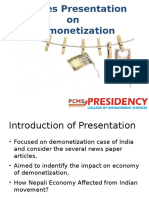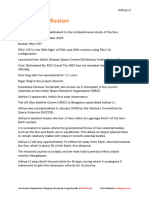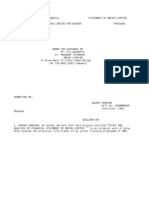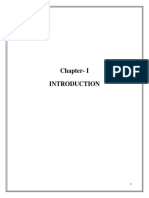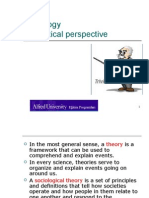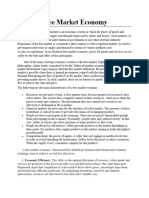Market Economy: Private Property
Market Economy: Private Property
Uploaded by
The Grizzled VetCopyright:
Available Formats
Market Economy: Private Property
Market Economy: Private Property
Uploaded by
The Grizzled VetOriginal Description:
Original Title
Copyright
Available Formats
Share this document
Did you find this document useful?
Is this content inappropriate?
Copyright:
Available Formats
Market Economy: Private Property
Market Economy: Private Property
Uploaded by
The Grizzled VetCopyright:
Available Formats
Market economy
market economy is a type of economic system where supply and demand regulate the economy,
rather than government intervention. A true free market economy is an economy in which all
resources are owned by individuals. The decisions about the allocation of those resources are
made by individuals without government intervention. There are no completely "free-enterprise"
or market economies.
One of the most important characteristics of a market economy, also called a free enterprise
economy, is the role of a limited government. Most economic decisions are made by buyers and
sellers, not the government. A competitive market economy promotes the efficient use of its
resources. It is a self-regulating and self-adjusting economy. No significant economic role for
government is necessary.
PRIVATE PROPERTY
Labor resources, natural resources, capital resources (e.g., equipment and buildings), and the
goods and services produced in the economy are largely owned by private individuals and
private institutions rather than by government. This private ownership combined with the
freedom to negotiate legally binding contracts permits people, within very broad limits, to obtain
and use resources as they choose.
FREEDOM OF ENTERPRISE AND CHOICE
Private entrepreneurs are free to obtain and organize resources in the production of goods and
services and to sell them in markets of their choices. Consumers are at liberty to buy that
collection of goods and services that best satisfies their economic wants. Workers are free to seek
any jobs for which they are qualified.
MOTIVE OF SELF-INTEREST
The "Invisible Hand" that is the driving force in a market economy is each individual promoting
his or her self-interest. Consumers aim to get the greatest satisfaction from their budgets;
entrepreneurs try to achieve the highest profits for their firms; workers want the highest possible
wages and salaries; and owners of property resources attempt to get the highest possible prices
from the rent and sale of their resources.
COMPETITION
Economic rivalry means that buyers and sellers are free to enter or leave any market and that
there are buyers and sellers acting independently in the marketplace. It is competition, not
government regulation, that diffuses economic power and limits the potential abuse of that power
by one economic unit against another as each attempts to further its own self-interest.
SYSTEM OF MARKETS AND PRICES
Markets are the basic coordinating mechanisms in our type of economy, not central planning by
government. A market brings buyers and sellers of a particular good or service into contact with
one another. The preferences of sellers and buyers are registered on the supply and demand sides
of various markets, and the outcome of these choices is a system of product and resource prices.
These prices are guideposts on which participants in markets make and revise their free choices
in furthering their self-interests.
LIMITED GOVERNMENT
A competitive market economy promotes the efficient use of its resources. As a self-regulating
and self-adjusting economy, no significant economic role for government is necessary. However,
a number of limitations and undesirable outcomes associated with the market system result in an
active, but limited economic role for government.
Merits
Competition between different firms leads to increased efficiency, as firms do whatever
is necessary—including laying off workers—to lower their costs;
Most people work harder (the threat of losing one's job is a great motivator);
There is more innovation as firms look for new products to sell and cheaper ways to do
their work;
Foreign investment is attracted as word gets out about the new opportunities for earning
profit;
The size, power, and cost of the state bureaucracy is correspondingly reduced as various
activities that are usually associated with the public sector are taken over by private
enterprises;
Demerits
Disparity in wealth and mobility exists in market economies because wealth tends to generate
wealth. In other words, it's easier for wealthy individuals to become wealthier than it is for the
poor to become wealthy.
Environmental damage results with no government regulations because it's usually more
expensive to produce in an environmentally sound manner, which reduces profits.
There tends to be a reduced social safety net, including such programs as unemployment
insurance, Social Security, and Medicare, because these programs are supported through
taxation.
Poor working conditions can result due to a lack of government regulations because health and
safety cost money, thus reducing profits.
Questionable priorities can result when the overriding decisions regarding production are profit-
motivated rather than serving the needs of the people in society.
You might also like
- Managerial Economics by Dominic SalvatoreDocument790 pagesManagerial Economics by Dominic SalvatoreAnand Deshmane100% (2)
- SG Topic5FRQs 63e05ca0641463.63e05ca17faee7.84818972Document17 pagesSG Topic5FRQs 63e05ca0641463.63e05ca17faee7.84818972notinioNo ratings yet
- Micro Teaching Is A Best Example For SimulationDocument2 pagesMicro Teaching Is A Best Example For SimulationdelnaNo ratings yet
- Adolescent Development - Assignment 2Document3 pagesAdolescent Development - Assignment 2api-3576446830% (1)
- Impact of Advertisement On SocietyDocument8 pagesImpact of Advertisement On SocietyMilind AudichyaNo ratings yet
- Study of Application and Adverse Effects of Pesticides On Human HealthDocument30 pagesStudy of Application and Adverse Effects of Pesticides On Human Healthbiditharyal6No ratings yet
- Project Report: Bharti AirtelDocument45 pagesProject Report: Bharti AirtelSahil SethNo ratings yet
- Family Law AssignmentDocument2 pagesFamily Law Assignmentisha04tyagiNo ratings yet
- DemonetizationDocument27 pagesDemonetizationSuman PoudelNo ratings yet
- Road Divider ReportLDocument88 pagesRoad Divider ReportLKrina Parekh100% (1)
- Overpopulation in IndiaDocument4 pagesOverpopulation in IndiaKumar Vaishnav50% (2)
- Cbse Class 10 Science Notes Chapter 16 Sustainable Management of Natural ResourceDocument5 pagesCbse Class 10 Science Notes Chapter 16 Sustainable Management of Natural ResourceRajnesh vanavarajanNo ratings yet
- Project Synopsis: ERP ImplementationDocument6 pagesProject Synopsis: ERP ImplementationAchal Kumar0% (1)
- RF Based Home-AutomationDocument58 pagesRF Based Home-AutomationRahul SainiNo ratings yet
- Assisting With Dilatation and Curettage ProcedureDocument18 pagesAssisting With Dilatation and Curettage ProcedureRoselineTiggaNo ratings yet
- Current Trends of International Trade in IndiaDocument10 pagesCurrent Trends of International Trade in IndiaponnulakshmiNo ratings yet
- PJDocument51 pagesPJRasel AlamNo ratings yet
- Wireless Battery Charging PresentationDocument20 pagesWireless Battery Charging PresentationKhala JaanNo ratings yet
- Federal System of GovernmentDocument8 pagesFederal System of GovernmentaleneNo ratings yet
- Mental Health Services in IndiaDocument10 pagesMental Health Services in IndiaMr cholaNo ratings yet
- Presentation On Money & BankingDocument15 pagesPresentation On Money & BankingRahul VyasNo ratings yet
- Aditya-L1 MissionDocument8 pagesAditya-L1 MissionVeeraVenkataSaiDurgaPrasad GubbalaNo ratings yet
- The Comprehensive Analysis of Educational Philosophy of Swami Vivekananda and Its Relevance in Modern India With Special Reference To His Man Making Concept of Education.Document5 pagesThe Comprehensive Analysis of Educational Philosophy of Swami Vivekananda and Its Relevance in Modern India With Special Reference To His Man Making Concept of Education.Ss SsNo ratings yet
- Manufacturing IndustryDocument12 pagesManufacturing IndustryRuchi GuptaNo ratings yet
- RJ Synopsis Antenna RevisedDocument7 pagesRJ Synopsis Antenna RevisedragvshahNo ratings yet
- Accident-Detection-And-Alerting-System RUSHIDocument49 pagesAccident-Detection-And-Alerting-System RUSHIRushikesh MuleNo ratings yet
- Corporate GovernanceDocument46 pagesCorporate GovernancevirajNo ratings yet
- Airtel PPT Report On StrategyDocument31 pagesAirtel PPT Report On StrategySteven PriceNo ratings yet
- Project On International BusinessDocument13 pagesProject On International BusinessShreya JainNo ratings yet
- Study and Analysis of Financial A ReportDocument26 pagesStudy and Analysis of Financial A Reportpriyanka81287No ratings yet
- Entrepreneurship - Problems and Challenges Faced PDFDocument5 pagesEntrepreneurship - Problems and Challenges Faced PDFLinda BrownNo ratings yet
- IGNOU MSCCFT Block-1Document180 pagesIGNOU MSCCFT Block-1Dr. Megha RichhariyaNo ratings yet
- Patanjali Project ReportDocument46 pagesPatanjali Project ReportashutoshNo ratings yet
- Untitled 0Document86 pagesUntitled 0accord123No ratings yet
- Crime Against Women in IndiaDocument5 pagesCrime Against Women in IndiabhartiNo ratings yet
- External Environment External Environment: An External Environment Is Composed of All The Outside Factors orDocument3 pagesExternal Environment External Environment: An External Environment Is Composed of All The Outside Factors orHimanshu DarganNo ratings yet
- Project Seminar Hospice FedoraDocument3 pagesProject Seminar Hospice FedoralalithaNo ratings yet
- Globalisation and Its Impact On Indian EconomyDocument35 pagesGlobalisation and Its Impact On Indian Economyvansh rajputNo ratings yet
- PROFESSIONAL ETHICS & Human Values Smita PatleDocument6 pagesPROFESSIONAL ETHICS & Human Values Smita Patlesmita gaydhaniNo ratings yet
- A Study On Digital Marketing and Its Impact On Consumers PurchaseDocument15 pagesA Study On Digital Marketing and Its Impact On Consumers PurchaseAbdul Nafi SarwariNo ratings yet
- Seem ADocument84 pagesSeem ANishant AwasthiNo ratings yet
- National Seminar Human Right PDFDocument3 pagesNational Seminar Human Right PDFLive LawNo ratings yet
- The Power Triangle in The Indian Ocean China India and The United StatesDocument20 pagesThe Power Triangle in The Indian Ocean China India and The United StatesSiddharth SinghNo ratings yet
- Article On Media Law and PolicyDocument29 pagesArticle On Media Law and PolicyKeshav MaheshwariNo ratings yet
- IPD Food Donation ProjectDocument49 pagesIPD Food Donation Projectkartik malikNo ratings yet
- Monetary and Fiscal Policies in IndiaDocument5 pagesMonetary and Fiscal Policies in Indiarakeshgopinath4999No ratings yet
- Theoritical PerspectiveDocument64 pagesTheoritical Perspectivenurgu100% (3)
- Assessment& ChallengesDocument9 pagesAssessment& ChallengesrtkobNo ratings yet
- Types of Employee RewardsDocument7 pagesTypes of Employee RewardskiranaomomNo ratings yet
- Role and Importance of COPRA, 1986Document11 pagesRole and Importance of COPRA, 1986Mugdha Tomar100% (1)
- Factors Influencing EntrepreneurshipDocument3 pagesFactors Influencing EntrepreneurshipHoye OyeNo ratings yet
- An Evaluative Study On The Role of Self-Help Groups in Empowering Women in IndiaDocument18 pagesAn Evaluative Study On The Role of Self-Help Groups in Empowering Women in IndiaDipannita Roy100% (1)
- A Study On Jagadguru Adi Shankaracharya With Specific Reference To The Principles and Practices of Management (Sankara As A Manager)Document6 pagesA Study On Jagadguru Adi Shankaracharya With Specific Reference To The Principles and Practices of Management (Sankara As A Manager)Vishnu HNo ratings yet
- A Project Report Submitted To J.N.T.U, KAKINADA in Partial Fulfillment of The Requirements For Award of The Degree ofDocument113 pagesA Project Report Submitted To J.N.T.U, KAKINADA in Partial Fulfillment of The Requirements For Award of The Degree ofJoanne GeorgeNo ratings yet
- International Trade PDFDocument4 pagesInternational Trade PDFanto juaNo ratings yet
- Agriculture in India Issues and ChallengesDocument9 pagesAgriculture in India Issues and ChallengesAkhil SatheeshNo ratings yet
- What Is A Market Economy?Document3 pagesWhat Is A Market Economy?Marisse AlvaricoNo ratings yet
- Free Market EconomyDocument6 pagesFree Market Economyabjafra3No ratings yet
- Market EconomyDocument7 pagesMarket EconomythehumughumuNo ratings yet
- What Is The Market EconomyDocument17 pagesWhat Is The Market EconomysharifNo ratings yet
- Section 1 D, E, F, GDocument26 pagesSection 1 D, E, F, Gtaona madanhireNo ratings yet
- UntitledDocument7 pagesUntitledFakayode AdedamolaNo ratings yet
- CT (BPS-15) Haripur MaleDocument35 pagesCT (BPS-15) Haripur MaleThe Grizzled VetNo ratings yet
- DelleChiaie TesitriennaleDocument75 pagesDelleChiaie TesitriennaleThe Grizzled VetNo ratings yet
- Believing in Books - Twenty-First Century Fantasy and The Re-EnchaDocument278 pagesBelieving in Books - Twenty-First Century Fantasy and The Re-EnchaThe Grizzled VetNo ratings yet
- Political Imbroglios in Kamila Shamsie's Home Fire and Mohammad Hanif's A Case of Exploding MangoesDocument14 pagesPolitical Imbroglios in Kamila Shamsie's Home Fire and Mohammad Hanif's A Case of Exploding MangoesThe Grizzled VetNo ratings yet
- Murder in The CathederalDocument20 pagesMurder in The CathederalThe Grizzled VetNo ratings yet
- Theories of Language AcquisitionDocument3 pagesTheories of Language AcquisitionThe Grizzled VetNo ratings yet
- Main Characters From The Caretaker': Writer: Harold PinterDocument6 pagesMain Characters From The Caretaker': Writer: Harold PinterThe Grizzled VetNo ratings yet
- Mixed Economic System: Characteristics of Mixed EconomyDocument3 pagesMixed Economic System: Characteristics of Mixed EconomyThe Grizzled VetNo ratings yet
- Name: Malik Anwaar Ahmed Class: BS English-6 Roll No: 5743 Subject: Literary Theory Department of EnglishDocument7 pagesName: Malik Anwaar Ahmed Class: BS English-6 Roll No: 5743 Subject: Literary Theory Department of EnglishThe Grizzled VetNo ratings yet
- Profit Maximization and Competitive Supply: Review QuestionsDocument14 pagesProfit Maximization and Competitive Supply: Review QuestionsTonoy Peter CorrayaNo ratings yet
- Answer Key For Practice Questions For Midterm ExamDocument4 pagesAnswer Key For Practice Questions For Midterm ExamhanaNo ratings yet
- Managerial Economics and Decision Making: Lecture BY: Kamal RegmiDocument30 pagesManagerial Economics and Decision Making: Lecture BY: Kamal RegmiEr. Sunil KhanalNo ratings yet
- Market Failure With Public GoodsDocument29 pagesMarket Failure With Public GoodsJefainNo ratings yet
- OligopolyDocument21 pagesOligopolyManu K AnujanNo ratings yet
- Man Kiw Chapter 14 Solutions ProblemsDocument7 pagesMan Kiw Chapter 14 Solutions ProblemsRod Utreras100% (2)
- R&D and Intellectual Property R&D and Intellectual PropertyDocument37 pagesR&D and Intellectual Property R&D and Intellectual PropertytanimaNo ratings yet
- Consolidation Worksheets: NSS Exploring Economics 3 (3 Edition)Document23 pagesConsolidation Worksheets: NSS Exploring Economics 3 (3 Edition)Rachel LeeNo ratings yet
- Project ReportDocument10 pagesProject ReportfarhanNo ratings yet
- Mengerial Economics PDFDocument41 pagesMengerial Economics PDFmohanraokp2279No ratings yet
- Econ Q and ADocument93 pagesEcon Q and AGel Mi Amor100% (1)
- Revised Syllabus BbsDocument54 pagesRevised Syllabus BbsSahil BangaNo ratings yet
- ENG ECON - Module1Document11 pagesENG ECON - Module1Lex Adrian Lucas VerdeNo ratings yet
- IEO Economics MCQ Answers 2022Document6 pagesIEO Economics MCQ Answers 2022Jameson ZhouNo ratings yet
- Microeconomics Course Outline PRM 43Document4 pagesMicroeconomics Course Outline PRM 43rajNo ratings yet
- Alfred MarshallDocument8 pagesAlfred Marshallisununu11No ratings yet
- 856 Economics QPDocument4 pages856 Economics QPMojahid AnsariNo ratings yet
- Samplepractice Exam March 2015 Questions and AnswersDocument13 pagesSamplepractice Exam March 2015 Questions and AnswersAmy LiNo ratings yet
- Graduate Prospectus 2018-2020Document242 pagesGraduate Prospectus 2018-2020Gail HoadNo ratings yet
- Applied Economics (Module 5)Document11 pagesApplied Economics (Module 5)Marlyn LotivioNo ratings yet
- Chapter 2 Competitive Market - Video-LectureDocument25 pagesChapter 2 Competitive Market - Video-LectureVulindhlela SitholeNo ratings yet
- Notes On Competition ACT, 2002: ISBN: 978-93-5419-312-5 2020Document29 pagesNotes On Competition ACT, 2002: ISBN: 978-93-5419-312-5 2020Ram SinghNo ratings yet
- EconFinal PracticeDocument10 pagesEconFinal PracticeleeNo ratings yet
- Case 4 Harringtom Collection+Financials - Mar2Document11 pagesCase 4 Harringtom Collection+Financials - Mar2Ameen Almohsen100% (1)
- Lesson Materials and Activity Sheets in Applied Economics - Week 6Document5 pagesLesson Materials and Activity Sheets in Applied Economics - Week 6Willie Cientos GantiaNo ratings yet
- Role and Size of Public SectorDocument5 pagesRole and Size of Public SectorANTHONY BALDICANASNo ratings yet
- Market Structures - EconomicsDocument4 pagesMarket Structures - EconomicsApphia MendozaNo ratings yet
- Bam 040 Managerial Economics Mock Phinma Exam Key AnswerDocument17 pagesBam 040 Managerial Economics Mock Phinma Exam Key AnswerdeawhenNo ratings yet








